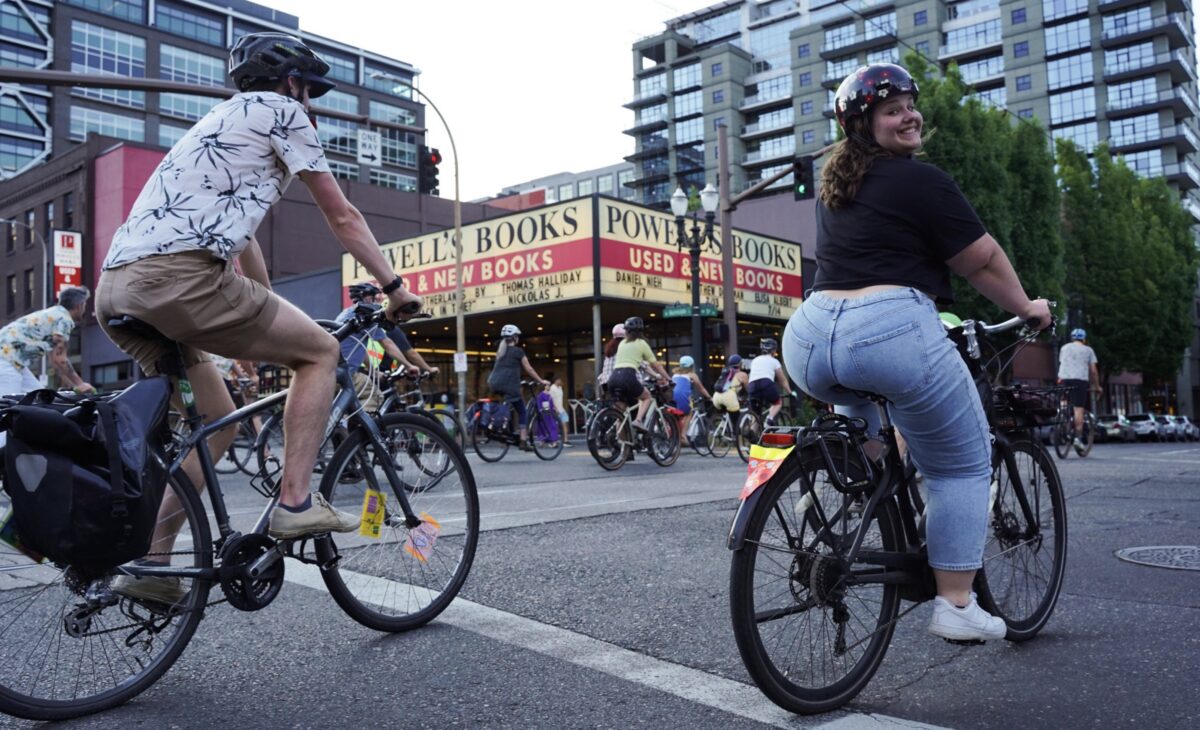
Despite years of terrible headlines and a persistent narrative from many people that Portland is “dying,” new data from the Portland Business Alliance shows that our downtown core is showing major signs of life.
According to numbers gleaned from annual counts compiled by Downtown Clean & Safe, a 213-block business improvement district managed by the PBA, the number of pedestrians downtown has jumped 64% from March 1 to June 9th of this year compared to the same period last year.
“People are returning to Downtown Portland in dramatic numbers compared to 2021. The city is far busier than last year, and the community is flocking into downtown for large-scale events, dinner and entertainment,” read a statement about the new numbers.
Hundreds of people watched the Portland Criterium on Saturday. And that was just one of many bike-related events that have helped bring people downtown this summer.
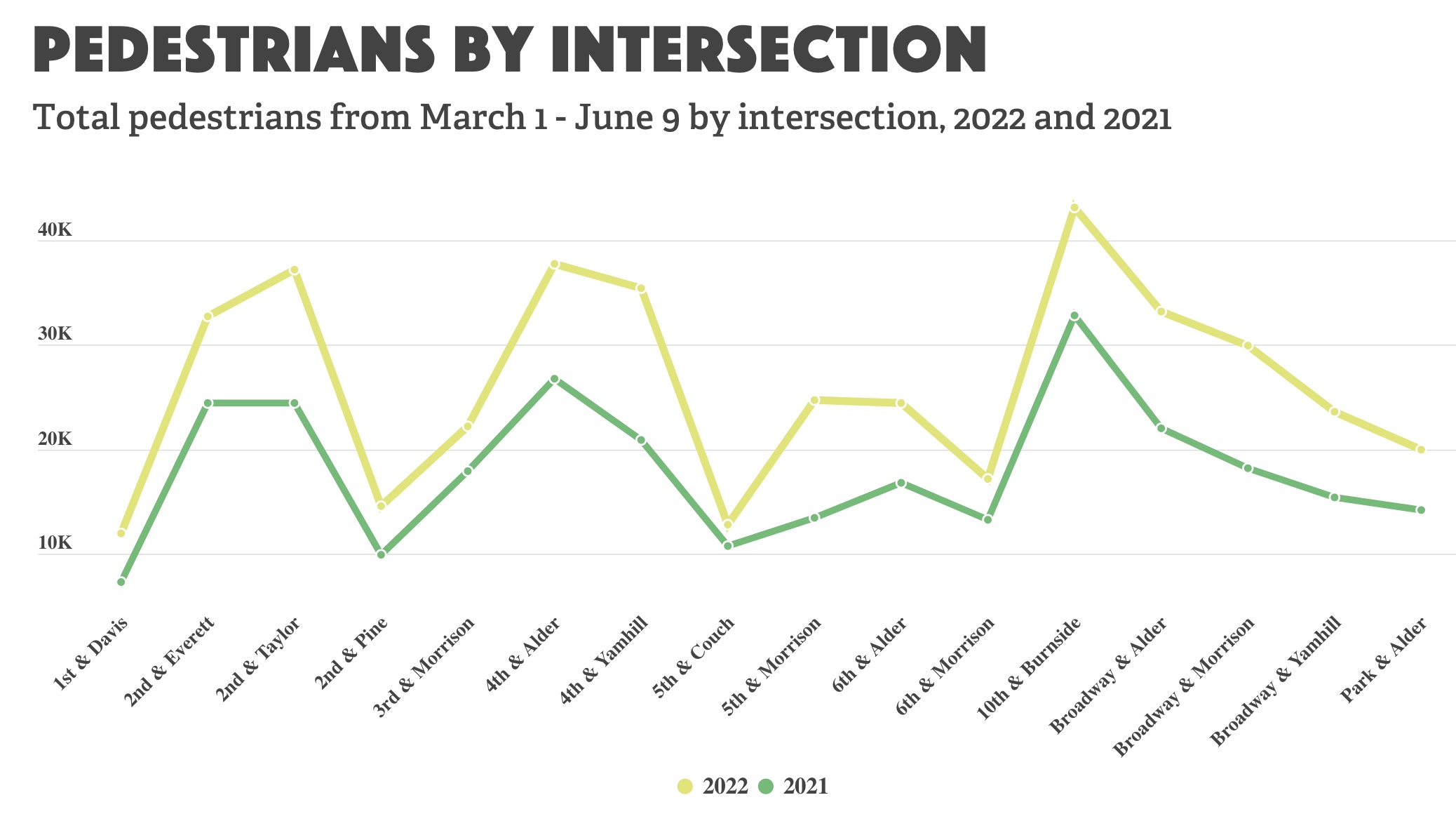
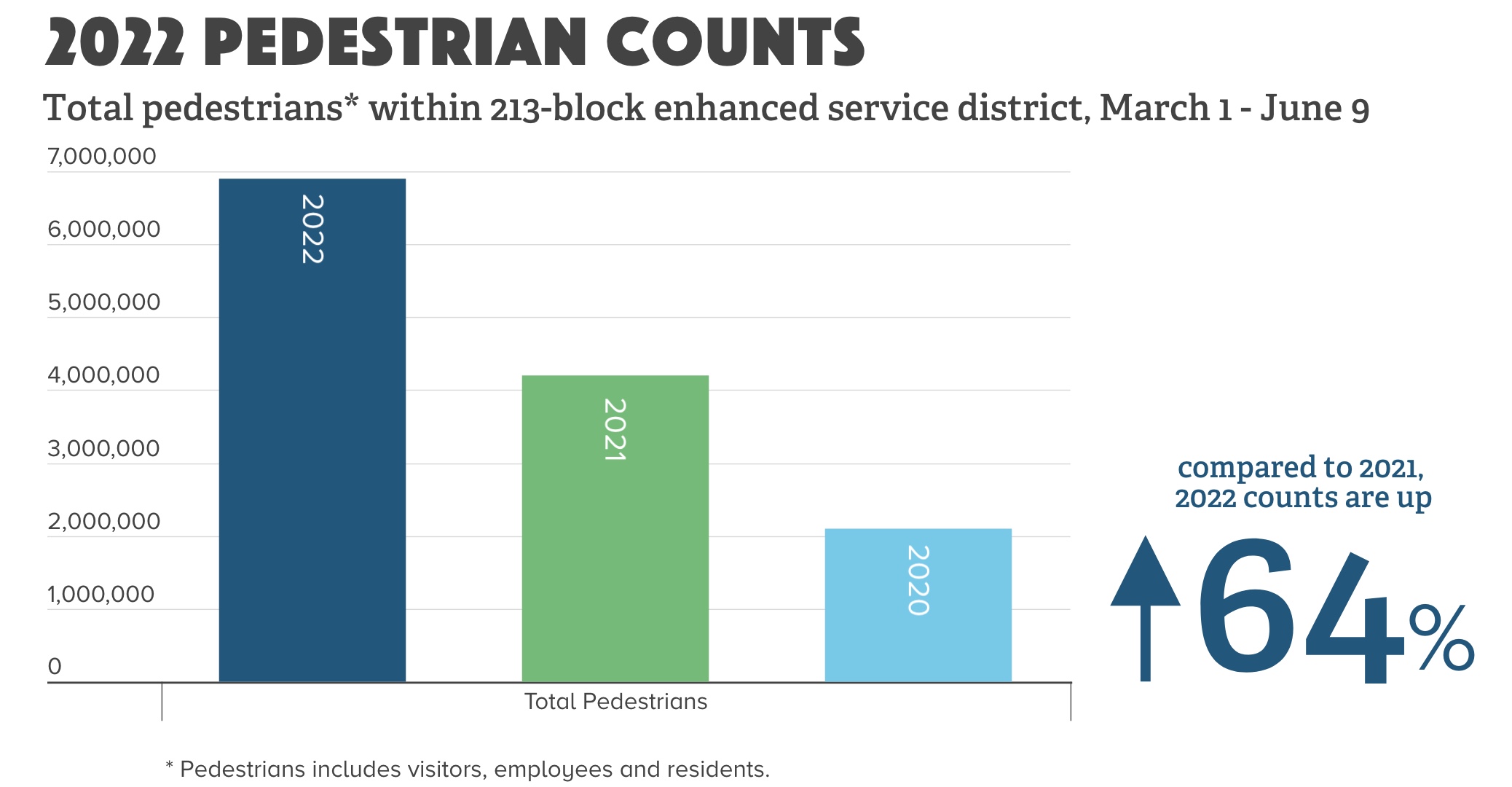
This is quite a different headline than last week when a study based on cell phone data blanketed local headlines because it showed Portland lagging far behind other cities in downtown recovery since the one-two punch of protests and the pandemic. But last week’s study conveniently left out several major downtown destinations including the Pearl District, Old Town, Portland State University and the culture and theater district.
To get their data, Downtown Clean & Safe used Placer.ai, an artificial intelligence tool that specializes in counting foot traffic. This has given them a much more comprehensive look at pedestrian counts than their previous methodology of using manual counts at a limited number of intersections and times.
According to the most recent numbers, the busiest foot traffic intersection downtown is West Burnside and 10th, right outside Powell’s Books.
Look more closely into the numbers here.



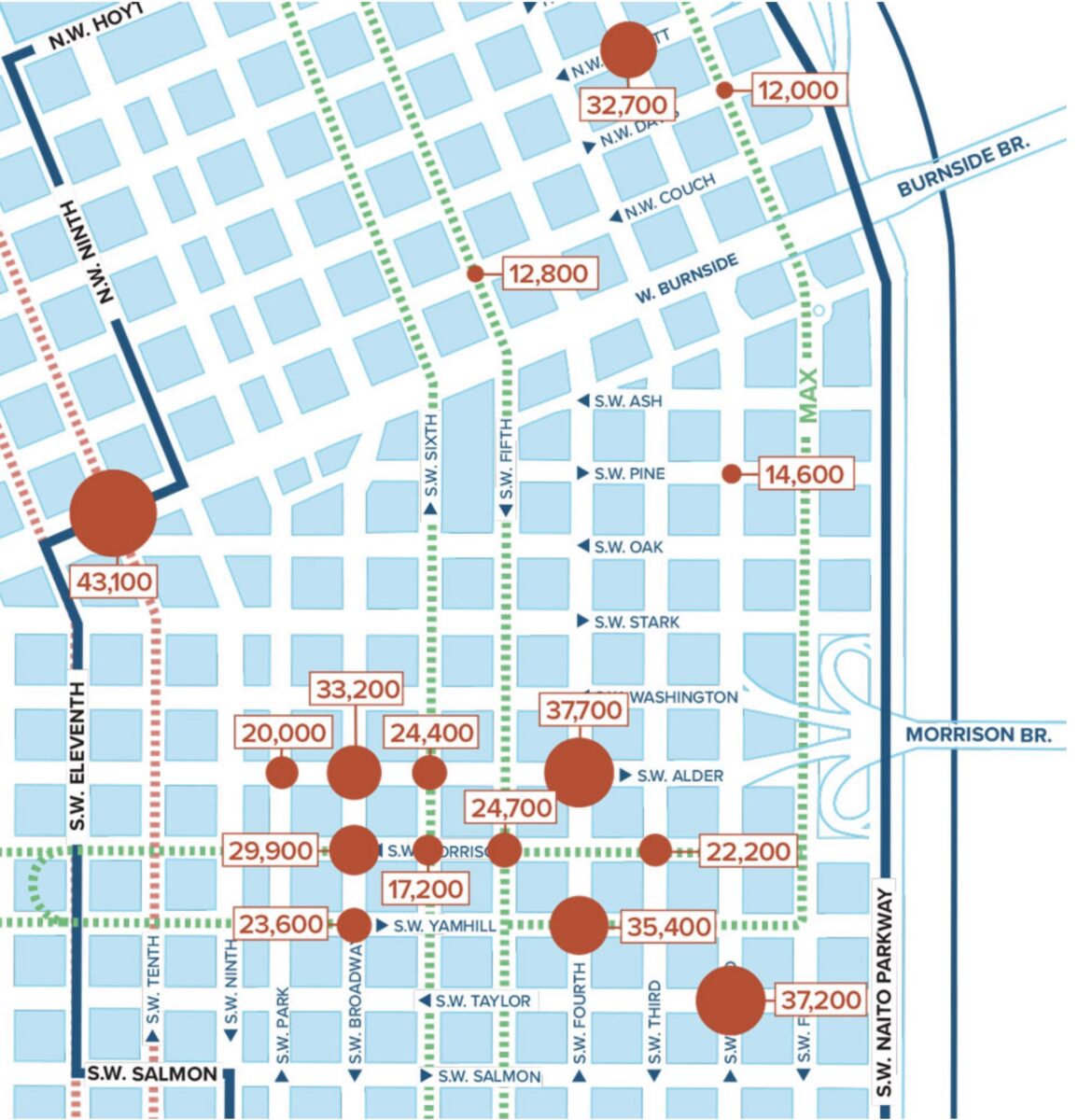
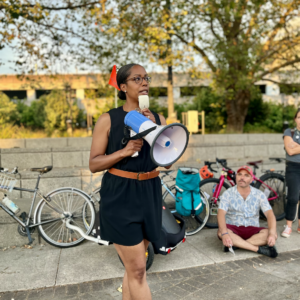
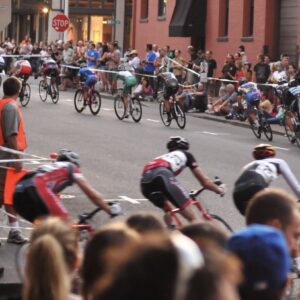
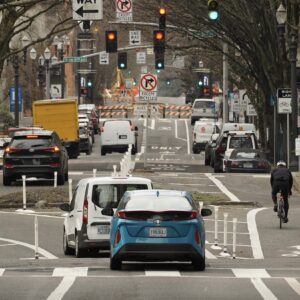
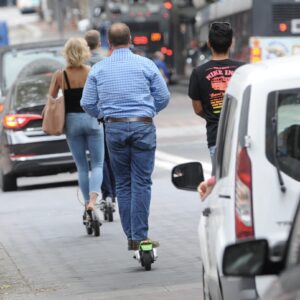
Thanks for reading.
BikePortland has served this community with independent community journalism since 2005. We rely on subscriptions from readers like you to survive. Your financial support is vital in keeping this valuable resource alive and well.
Please subscribe today to strengthen and expand our work.
Yeah, too bad 20% of my co-workers didn’t get this “report” before they quit due to the forced re-entry of having to go to the office downtown instead of continuing to WFH.
The PBA has every incentive (aka property values) to want to interpret numbers a certain way. Afterall, they are using a new method to track compared to the prior 2 years. Wonder what story the numbers would have told if they had been all the same method?
Yeah the different methodology makes it not apples to apples I suppose, but I am downtown about once a week and it certainly feels like the past few months have seen a big uptick in traffic so the numbers jibe with my experience FWIW. Also, yes the PBA has incentive to juice these numbers, but you could argue they’ve tried to juice things the other way in the past when it suited their interests. So if the PBA has decided that the best move for them right now is to create a “downtown is back!” narrative than that is very newsworthy (and also good, I think).
I think y’all are misunderstanding the language here.
Past years’ reports used a different counting methodology, but this year’s report uses a single data source to compare pedestrian counts between 2019 & 2022. It should be apples-to-apples.
Do you think this would’ve changed your coworkers opinions? None of my coworkers who worked downtown have gone back at all, and I don’t think they should have to. For me, that’s what makes these #s more impressive. I know other businesses have not been as accommodating as mine but from the time I spend downtown (visiting parks, museums and running errands on bike and bus, not working) this # seems accurate enough.
I’m not a fan of the PBA, but I don’t think they have an incentive to manipulate numbers. If Downtown really was seeing fewer people (or the same number) as 2021 they’d be screaming about that loudly. As someone who does work downtown my impression is that this data feels correct.
Do you happen to know how these numbers compare to pre-pandemic?
The problem with this report Gerald is that because this isn’t an engineering firm or gov’t agency, it looks like their methodology has changed from year to year — and I don’t think they have made public enough of the data that we can get a good apples-to-apples comparison.
71.4% on big even days/weekends. From the linked report:
“When looking at Saturdays over Memorial Day and the first two weekends in June (which included the Rose Festival Parades, City Fair, fireworks and Dragon Boat Races), the number of people downtown was recorded at 71.4% of 2019 levels.”
The first study had a very straightforward method of counting cell phones. Not perfect, but a reasonable approach.
The second study used “artificial intelligence”. How does that count people, and is it somehow more accurate?
It’s good news, but color me skeptical. I was downtown today (near PSU) and it seemed pretty quiet for a weekday. Not absolutely desolate, but quiet.
AI doesn’t really mean anything (source: I work in AI)
And I don’t think it’s 2 different data sources, I think placer uses cell phone data to estimate ped counts. Should just be the 1 data source throughout. They probably use some statistical models or neural nets to smooth out & clean up data or fill it in when it’s missing, then call it AI so people will pay 2x more for the same product.
My comments are written by an AI.
Its in between terms at PSU, of course there’s not many people around campus.
Comparing any statistics to those observed to the depths of the pandemic is worthless.
How do the volumes compare to 2019? Twenty percent? Fifty percent? Eighty percent?
I haven’t been to Powell’s since the beginning of the pandemic. I have no idea how much pedestrian traffic is there and how it compares to the pre-pandemic and pandemic eras.
FWIW, I was at Powell’s on a Friday morning and it was as busy as I’ve ever seen it ,there seemed to be lots of foot traffic throughout that area.
https://www.bizjournals.com/portland
Not sure everyone agrees with your poll.
I hope downtown comes back, they are sweeping like crazy in old town.
Could be a factor.
Which article are you linking to? I’m only really seeing somewhat positive headlines in the more *recent* news. Things like: “Portland Law firm moving to Pioneer Courthouse Square Location” or “5 employers are committed to downtown Portland”
https://www.oregonlive.com/business/2022/08/downtown-portlands-pandemic-recovery-remains-anemic-study-finds.html?outputType=amp
This was the study the O rehashed.
Seems seriously flawed, as well.
Who knew that people still bought books in person…unless its all tourists or Powells now sells pot / CBD notepads?! …
“the busiest foot traffic intersection downtown is West Burnside and 10th, right outside Powell’s Books” – Bike Portland
My husband and I walked to REI and Powell’s this morning from the NW 23rd area where we live. There were a nice #of people on the streets and in Powell’s. Screen Door restaurant outside seating was totally full at 10:30 a.m. definitely more people than in the past year or two, but I can’t remember back to 2019.
I just returned from a SOLVE cleanup event in the North Park Blocks and along neighboring streets. I know this is also anecdotal, but the lunchtime crowds were bustling. I’ve done many photowalks to and through all of downtown since 2019, and my gut sense is that things are finally turning around.
That surprised me, too. But I think a factor is that Burnside for the next few blocks to the east has no signalized intersections for crossing. It’s got crosswalks, but they’re unattractive to use because there are two lanes of usually-heavy traffic going each way. So people cross at the nearest reasonable crossing, which happens to be at Powell’s.
Burnside is also commercially somewhat dead and unpleasant along the few blocks east of 10th (as are the blocks north and south of Burnside, in comparison to the much livelier blocks north and south of Powell’s) so there’s also less reason to cross east of 10th.
Love your photo.
Both studies are true, that’s the takeaway. Are people more willing to venture out in Portland this summer than last? Yes. At the same time, is there very little traffic in the employment core of downtown during the work week? Also, yes.
It is not surprising to me that a tourist is willing to wait in line outside Powell’s on a Saturday in June. It also isn’t surprising that lots of people don’t want to work downtown anymore. I don’t, it wasn’t that fun in 2019, it must be awful now. I wish we had a sales tax because then at least the city would be benefitting from the book buying, but I worry far more about why I am getting ads on LinkedIn telling me that the top 4 floors of PacWest Center are available for the first time in 20 years.
I wish Portland had a sales tax too (in addition to only the bike tax)…so as to reduce the traffic friction of all the shopper traffic on the Interstate Bridge…that might be an idea for the IBR project to implement as a trip reduction measure during construction and after…
Everything is coming up roses when it comes to the PBA. Downtown sucks and is has since the pandemic and riots/looting. Anyone with eyes can plainly see.
What mystifies me is that historically more than half of commuters to downtown prior to the pandemic were government, so why has the city of Portland, Mult. Co., State of Oregon, ODOT and others persisted in pretending WFH is a viable and sustainable solution to a healthy and sane downtown. It can’t all be trinket shops and tourists down there, we need normal people too. *** Moderator: deleted last few sentences, derogatory. ***
I love the Oregonian but they simultaneously report stories like “OMG no one is downtown!” and are then shocked about lackluster numbers on these studies…but then, in paragraph 10, they note that the study basically studied only the part of SW where office buildings live – and nothing else lives – to point out that MAYBE the study left out important areas.
In the photo, isn’t that the famous Tik Tok star Jenna Love Bikes?
https://youtu.be/XzI94sQOk9U
Yes indeed!